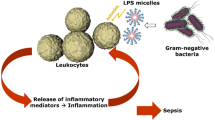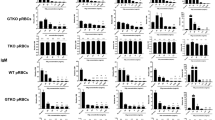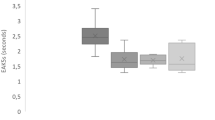Abstract
DURING the continuation of work aimed at explaining the development and possible significance of the Thomsen phenomenon1 in vivo (so-called poly-agglutinability), it proved practicable to produce hæmolytic anæmia in guinea pigs by T-transformation of their erythrocytes in vivo. The term ‘T-transformation’ applies to the production of the specific receptor-T in erythrocytes through the activity of an enzyme formed by various bacterial species1.
This is a preview of subscription content, access via your institution
Access options
Subscribe to this journal
Receive 51 print issues and online access
$199.00 per year
only $3.90 per issue
Buy this article
- Purchase on Springer Link
- Instant access to full article PDF
Prices may be subject to local taxes which are calculated during checkout
Similar content being viewed by others
References
Friedenreich, V., “The Thomsen Hemagglutination Phenomenon”, dissert. (Levin and Munksgaard, 1930).
Ejby-Poulsen, P., Nature, 173, 82 (1954).
Burnet, F. M., and Anderson, S. G., Aust. J. Exp. Biol. Med. Sci., 25, 213 (1947).
Author information
Authors and Affiliations
Rights and permissions
About this article
Cite this article
EJBY-POULSEN, P. Hæmolytic Anæmia produced Experimentally in the Guinea Pig by T-transformation of the Erythrocytes in vivo with Purified Concentrated Enzyme. Nature 174, 929–930 (1954). https://doi.org/10.1038/174929a0
Issue Date:
DOI: https://doi.org/10.1038/174929a0
Comments
By submitting a comment you agree to abide by our Terms and Community Guidelines. If you find something abusive or that does not comply with our terms or guidelines please flag it as inappropriate.



